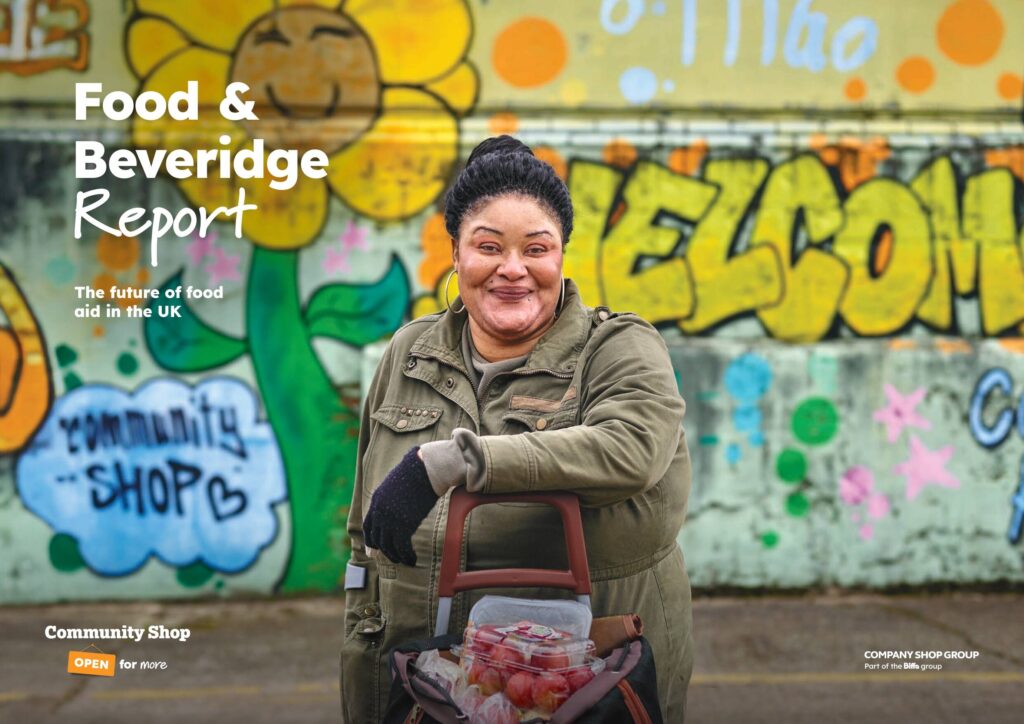Award-winning social supermarket urges Government to end reliance on emergency food parcels

Community Shop, the UK’s first social supermarket chain, has unveiled a ground-breaking white paper titled Food and Beveridge report: the future of food aid in the UK, which calls on the government to adopt a sustainable, person-centred approach to tackle the growing issue of food insecurity and end reliance on emergency food parcels.
Inspired by Sir William Beveridge’s revolutionary vision paper, published in 1942, which transformed British society and led to the establishment of the welfare state, Community Shop’s new report – built on more than a decade of proven impact – calls on the government to take a holistic, person-centred approach to tackle food insecurity at its root, end dependence on emergency food parcels, and to focus food policies on outcomes not process.
Community Shop, the social enterprise arm of the UK’s leading surplus redistributor Company Shop Group, is advocating for a sustainable and scalable system that addresses food poverty by tackling the immediate need for access to food and moving away from short-term dependency.
Executive chairman of Community Shop, Gary Stott, said, “The food insecurity crisis cannot be solved by emergency food parcels and other short-term fixes, such as food banks. We urge the government to tackle the root causes of food insecurity by transforming food aid for the future, prioritising dignity and sustainability, and moving away from short-term sticking plasters. Community Shop’s person-centred model, refined over the last 10 years, has delivered transformational outcomes for over 72,000 families.
“The continued expansion of provision like Community Shop is reliant on government recognising its sustained outcomes, and ensuring that support is equally available to all organisations delivering this kind of provision. We are now eager to share our proven approach and learnings with decision makers, roll out the recommendations, and ignite long-term change.”
The report also calls on government to mandate food waste reporting, in line with the food waste hierarchy, with realistic timescales for implementation. Alongside this, it must be recognised that charitable and not-for-profit redistribution cannot solve the food waste challenge in isolation and that equal support should be given to commercial redistribution. Only by incentivising businesses, and clearly signposting the full range of services available for surplus management, can the move towards a circular economy be accelerated with the required scale.
The report includes six key policy recommendations which outline the step change needed to address both food insecurity and food waste at scale in the UK:
- Beyond emergency food parcels: emergency food parcels cannot provide a sustained solution to food insecurity. The Labour Government, in its 2024 manifesto, committed to ending the use of emergency food parcels. To achieve this, support must transition away from food banks towards self-sustaining organisations and social enterprises, with long-term help offered to those who need it.
- Outcome-focused food security policy: food policies should focus on outcomes, not processes, and avoid favouring charities and grassroots bodies over businesses and social enterprises. Incentives, such as VAT relief, should be offered based on the act of donating surplus.
- Holistic support tackling the root causes: tackling food insecurity should go hand-in-hand with the delivery of longer-term financial, educational, training and wellbeing support, to ensure people involved retain agency, are treated with dignity, and ultimately are empowered to improve their circumstances permanently.
- Mandatory food waste reporting: the government should mandate food waste reporting in line with the food waste hierarchy with realistic timescales for implementation, incentivising businesses and clearly signposting the full range of services available for surplus management.
- Accelerate progress towards a circular economy: Government and industry must acknowledge that charitable and not-for-profit redistribution cannot solve the food waste challenge in isolation and that equal support should be given to commercial redistribution.
- Physical infrastructure for food-aid: food aid provision works best when delivered through physical infrastructure such as shops which anchor support in the community, contribute to urban regeneration, and support the local economy through the creation of paid roles. To support this, new powers are needed for local authorities to take over any unused building in deprived areas to put them to community use.
The white paper features contributions from industry experts Dr Christina Holweg, Andrew Forsey OBE and Dr Clive Black plus a foreword from long-time supporter and advocate for the power of food in communities, Ainsley Harriott MBE. Community Shop is supported by hundreds of stock partners including Aldi, Asda, Iceland, McCain, M&S, Nestlé, Ocado and Samworth Brothers.
Related content
Source: foodanddrinktechnology.com

